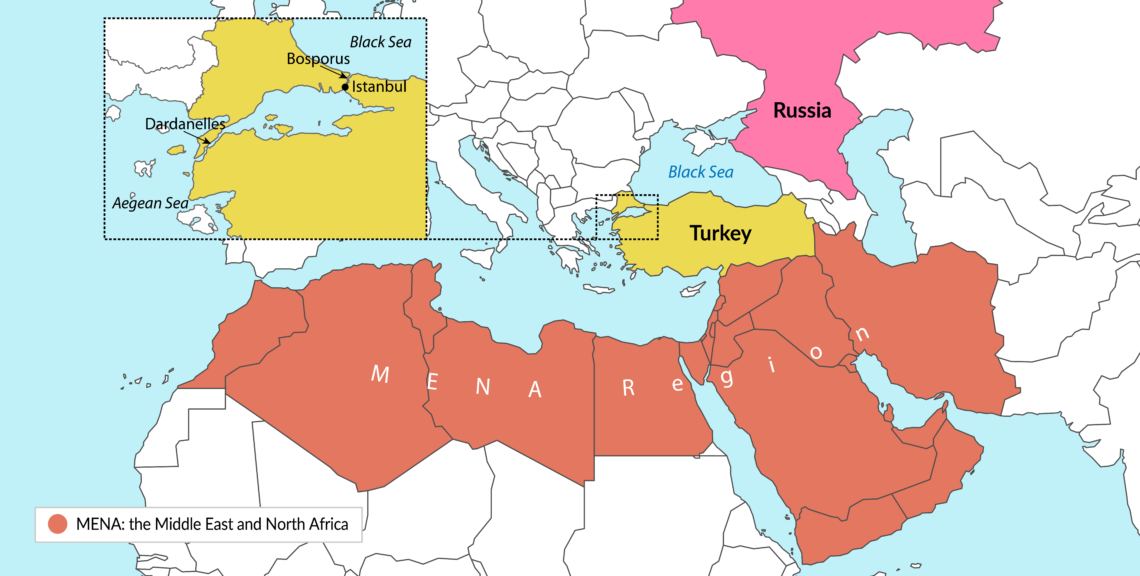Turkey and Russia in the Eastern Mediterranean and Black Sea
Turkey and Russia, with their history of centuries-long rivalry in the Black Sea and the Middle East, are both pursuing deft regional policies that reflect a complex web of aligned and conflicting strategic interests.

The strongest regional power in the Eastern Mediterranean is Turkey. In the Black Sea area, both Moscow and Ankara play decisive roles. The Middle East and North Africa are of crucial importance for Turkey, as neighbors. These regions are also of geostrategic interest for Russia.
For centuries, the two powers had conflicts in the Balkans, the Black Sea region and the Caucasus. Control over the Bosporus strait and the Dardanelles was particularly contested. The two narrow waterways constitute Russia’s only access to the Mediterranean. Taking possession of Istanbul was one of the main strategic objectives of Imperial Russia.
During the Cold War (1947-1991), Turkey was a natural and close ally of the West, helping protect the free world from the Soviet threat. It remains a muscular, valuable member of NATO.
Conflict and cooperation
In recent decades, the Middle East has become increasingly unstable as its power structures changed. Through inconsistent, short-term and naive policies, the United States and Europe lost much of their credibility and influence in the region. Both Moscow and Ankara better understood the Middle East’s complex situation and necessities, and more skillfully defined their interests. Their policies can be described as a combination of conflict and cooperation.
Both powers want to see a certain degree of stability in the region and to fight, or at least contain terrorism. This is where their interests align. Moscow and Ankara seek good relations with Iran and want Western sanctions to be lifted. On the dispute concerning oil and gas exploration and drilling rights in the Mediterranean Sea between Turkey, Greece and Cyprus, Russia does not take a position.
Ankara concluded that it could not be entirely dependent on the West for the deliveries of sophisticated weapons systems.
This combination of converging and conflicting interests necessitates frequent meetings between the two countries’ decision makers, especially the two presidents, Recep Tayyip Erdogan and Vladimir Putin. Frequent contacts lead many in the West to believe they have a close relationship, which is not the case. In fact, Turkey and Russia display prudence and pragmatism to avoid an unnecessary escalation in volatile relations – a textbook example of realpolitik.
In Syria, Russia – like Iran – wants to maintain the regime of President Bashar al-Assad, while Turkey is clearly against it. A strong Iranian influence through Syria all the way to Lebanon is not in Ankara’s interest. However, Russia recognizes Turkey’s rationale in trying to prevent the Kurdish armed forces, known as the People’s Protection Units (YPG), from gaining control of the Kurdish area in Syria, and the resulting Turkish military intervention. Russia also assisted the Turkish armed forces during the evacuation of civilians in the area.
Russia supports Field Marshal Khalifa Haftar, probably the strongest political actor in Libya, in the fight against the UN-backed Government of National Accord (GNA). Ankara has reached an agreement with the GNA on a division of drilling and exploration rights in the Mediterranean, against claims by Cyprus and Greece. Turkey is ready to support the GNA militarily against the insurgents of Marshal Haftar’s Libyan National Army (LNA).
The Middle East and North Africa (MENA) and the Eastern Mediterranean are direct neighbors of Turkey. Inevitably, its interests in the region sometimes differ from those of the U.S. or Europe. The situation on the ground can occasionally necessitate, in Turkey’s view, military interventions which the West does not support. As a result, Ankara concluded that it could not be entirely dependent on the West for the deliveries of sophisticated weapons – which explains Turkey’s purchase of the Russian S-400 air defense missile system, rather than the corresponding American system. The procurement decision does not amount to a denial of Turkey’s NATO obligations.
Outside the MENA region, the old Turkish-Russian rivalry from Ottoman times prevails today. Ankara supports Ukraine’s territorial integrity, especially on the Crimea issue. An independent Georgia in the Caucasus is also in Turkey’s vital interest.
A volatile, potentially dangerous, conflict area is the Western Balkans. The European Union’s irresponsible decision to freeze EU accession negotiations with Albania, Kosovo, Macedonia and Montenegro opens the way for Russia to increase its influence in the region, an old target of Russian politics. This is also, however, Turkey’s direct neighborhood. Larger powers competing for influence could stir up old religious and ethnic conflicts in the area.
Turkey and Russia are important trading partners, and they are both very conscious of this fact. Realpolitik is, therefore, likely to prevent direct clashes between these old rivals. It does, however, leave much room for the pursuit of antagonistic policies in third-party territories.
